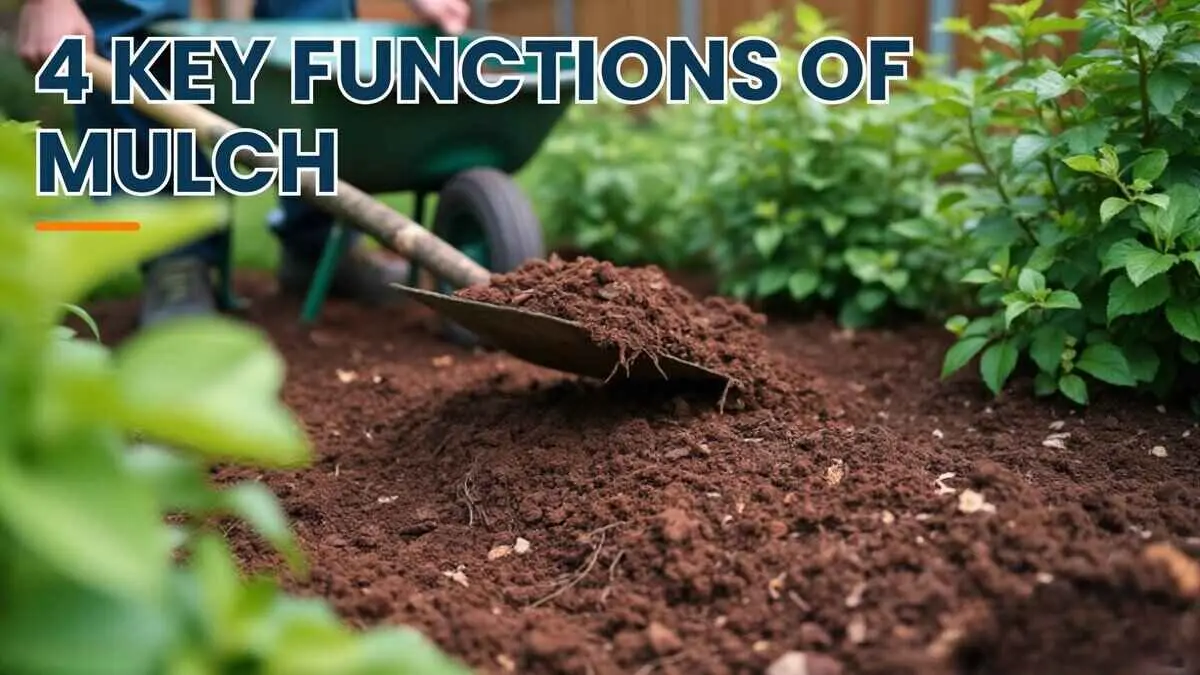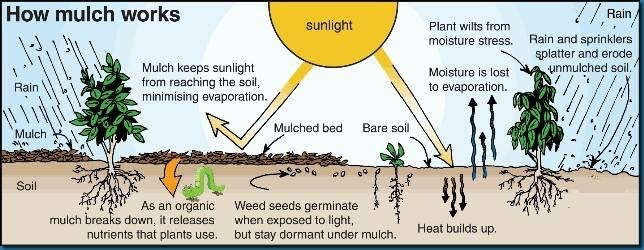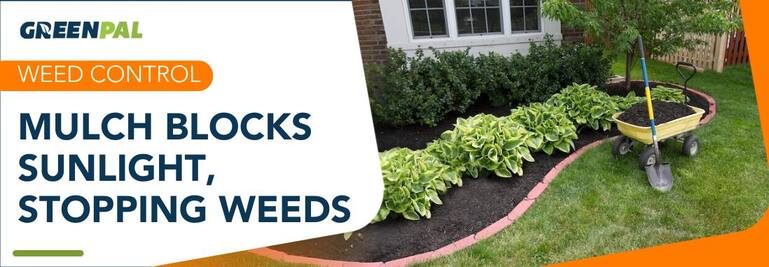How Mulch Works: The 4 Functions of Mulch in Your Garden
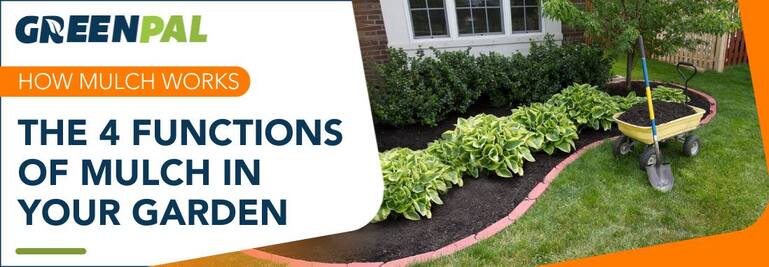
In this guide you will learn everything you need to know about how mulch works.
It’s true, there are a lot of great reasons you should apply mulch.
However, there are four major functions that mulching the garden serves.
So without further ado, let’s jump right on in, and see how exactly mulch works, and why mulch is so important!
How does mulch come?
There are a variety of mulches which vary in composition.
Mulch is available in bags or bulk, in various materials like wood chips, straw, bark, or rubber.
It is most commonly made from organic material such as:
Wood chips,
Bark chips.
Mulch can also be made from compost or manure, or inorganic substances like recycled tires. Whichever mulch you choose, spreading a few inches of mulch around your garden beds can be a great way to get the most out of your garden,
By spreading mulch around your trees, plants and garden beds, you will save yourself time and money. All while making your landscape look its best!
Why? Well here are four major functions of mulch.
Understanding How Mulch Works: The 4 Functions
Function 1: Mulch Prevents Erosion
Simply put, without mulch soil is vulnerable to the elements. Wind, rain, and even sprinklers can cause unprotected soil to erode, in no time at all.
Erosion causes many problems for your plants. Those problems have effects that can kill a plant or tree.
Worst of all, erosion depletes vital nutrients from the soil. Plants need a healthy diet in order to survive an thrive. Important nutrients like phosphorus and nitrogen are flushed out of the soil when no mulch or ground cover is present.
Mulch not only deters erosion, it provides much-needed nutrients for the soil as it breaks down. This is aided by the daily business of worms and other organisms.
No matter what climate you're in, your plants will need mulch.
Without mulch, you are wasting money:
For example, let's say you spread mulch in your garden beds which haven’t been mulched.
After only a rain or two 80% of the nutrients will be washed away. A mulched bed on the other hand is much better at retaining nutrients, and soil.
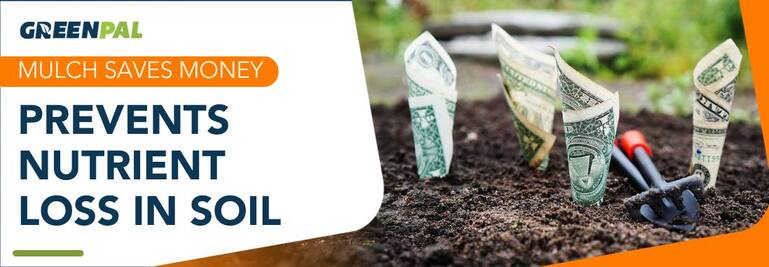
Function 2: Mulch Slows Evaporation
Nutrients are important, but so is water. Without mulch, soil is left to bake in the sun, which increases the rate of evaporation!
This is especially problematic for malnourished plants or plants with exposed roots.
Mulch corrects this problem by providing an excellent barrier. This barrier will prevent the sun from reaching the soil, and thus minimizes evaporation.
Best of all, mulch also acts like a sponge and absorbs water. Preventing it from running out of your garden beds.
Here's the catch, be sure to mulch properly. Mulching too thick, or too close to your plants can be just as devastating as no mulch at all.
If you want to keep your lovely mounded garden beds, mulching is your best way to keep your soil from eroding.
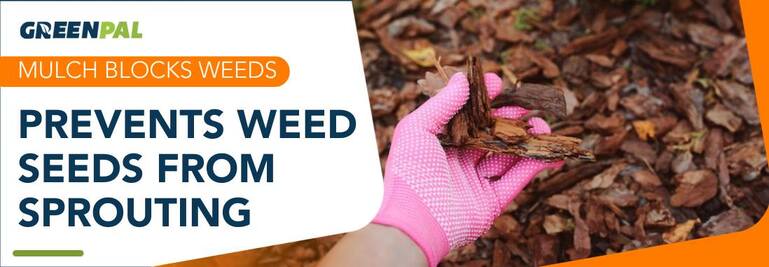
Function 3: Mulch Prevents Weed Growth
When weed seeds are exposed to the sun, they germinate!
However, when they are buried beneath a layer of mulch, they do not germinate. It almost seems too good to be true, but mulch greatly reduces the growth of weeds.
Here's the deal, if you have spent long hours weeding your flower beds, you really must do yourself the favor of properly mulching before you call the job finished.
If not, the weeds will be back before you know it, and you'll have a job to do all over again.
Of course, weeds will eventually come back. But they will be much far and fewer between when you mulch your garden beds. Additionally, weeds growing in a layer of mulch are generally easier to pull.
Function 4: Mulch Balances Ground Temperature
The final function that mulch serves is balancing temperature extremes.
No matter the climate, hot or cold. Mulch prevents large ground temperature swings which can be harmful to plants.
In warm climates, mulch keeps the soil from getting to hot, and dehydrating or burning plants.
In cold climates, mulch keeps the ground warmer, and prevents the ground from freezing, or at least prevent it from freezing as deeply. That is why it is a good idea to mulch your garden in spring and fall in colder climates.
Frequently Asked Questions
Why mulch is better?
Mulch suppresses weeds, retains soil moisture, regulates soil temperature, and adds nutrients as organic mulches decompose.
Mulch is a game-changer for your garden.
Here's why:
- Conserves soil moisture
- Moderates soil temperature
- Improves soil health over time (organic mulch)
- Adds aesthetic appeal
Which type of mulch is best?
Shredded bark or wood chips are excellent all-purpose mulches for most landscaping needs.
Here's a breakdown of different mulch types and their best uses:
Mulch Basics
- Shredded bark or wood chips: A versatile choice for most landscaping needs.
- Organic mulches: Improve soil fertility and texture over time as they decompose. Popular options include wood chips, bark, straw, and leaf mold.
- Inorganic mulches: Offer longevity and low maintenance. Examples include rubber, stones, and synthetic fabrics.
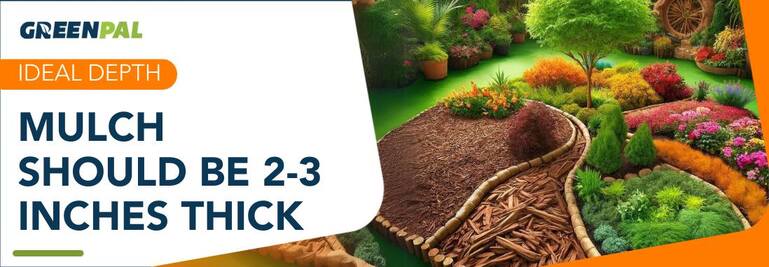
Specific Mulch Types
- Wood chips or bark: Popular for their moisture retention and soil-enriching properties. Great around trees, shrubs, and in flower beds.
- Straw: Ideal for vegetable gardens. It's easy to apply and improves soil as it breaks down.
- Rubber mulch: Long-lasting and shock-absorbent, making it perfect for playgrounds or areas needing durable ground cover.
- Cocoa mulch: Adds a rich color and pleasant smell. Use with caution, as it can be toxic to dogs.
-
Grass clippings: A free and convenient way to replenish nutrients in your lawn when left on the surface after mowing.
How Thick Should the Mulch Layer Be in My Garden?
A layer of mulch should be approximately a few inches thick, 2-3 inches is sufficient. However, it's important to avoid over-mulching or piling it too close to plant stems to prevent potential issues like root rot or pest infestation.
How long does mulching last?
Organic mulches (wood chips, bark, etc.) decompose over 2-6 years depending on material; inorganic mulches like rubber or rocks can last indefinitely (five or more years) but may shift over time.
Does mulch help with drainage?
Yes, mulch helps improve soil drainage by preventing soil compaction and promoting water infiltration.
A Final Word From Your Yard: I Want To Be Beautiful
This comprehensive guide on mulching covers all aspects of how and why to use mulch in your garden.
Mulch, made from organic materials like leaves, wood chips, or inorganic substances, serves four key functions in your garden: preventing erosion, slowing evaporation, inhibiting weed growth, and balancing ground temperatures. It's vital for nutrient retention, water conservation, and protecting plants against temperature extremes.
Ideal mulching time is mid to late spring, with a recommended thickness of 2-3 inches. Suitable for all climates, mulch is a must-have for a healthy, beautiful garden.
No doubt about it, a well-mulched landscape is lovely thing to behold. It will always have that little something extra, a finished look which says you took the time to do the job right.
In fact, properly mulching your flower beds will always say: I care.
If you need to find a lawn care professional to help you mulch your landscapes or cut your grass, turn to the lawn care pros at GreenPal.



 Share
Share